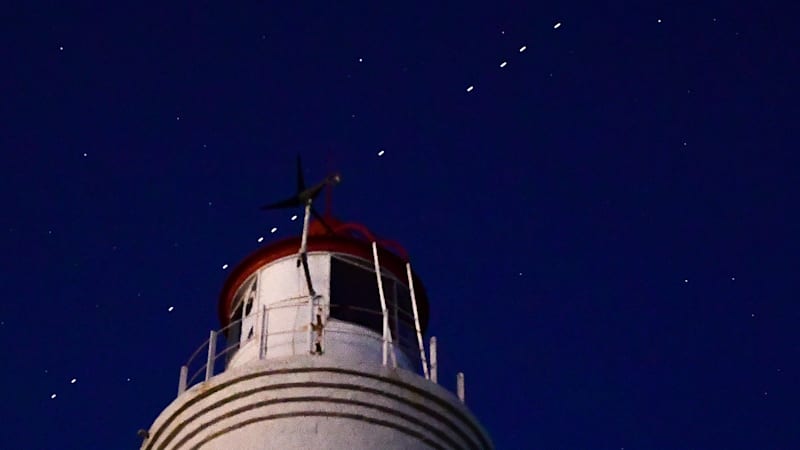A line of Starlink satellites crosses the night sky over Vladivostok, Russia. (Getty images)
BEIJING — Chinese citizens lashed out online Monday against billionaire Tesla founder Elon Musk’s space ambitions after China complained that its space station had been forced to take evasive measures to avoid collisions with satellites launched by Musk’s Starlink program.
The satellites of Starlink Internet Services, a division of Musk’s SpaceX aerospace company, had two “close encounters” with the Chinese space station on July 1 and October 21, according to a document filed by China with the UN space agency earlier this month. China currently has a crew of three on board the station.
“For security reasons, the China Space Station has conducted a pre-emptive check to avoid collisions,” China said in a document published on the website of the United Nations Office for Outer Space Affairs.
The complaints have not been independently verified. SpaceX did not immediately respond to a request for comment.
In a post on China’s Twitter-like Weibo microblogging platform on Monday, one user said Starlink’s satellites were “just a pile of space junk,” while another described them as “American space warfare weapons.”
With nearly 30,000 satellites and other debris believed to be orbiting the planet, scientists have urged governments to share data to reduce the risk of catastrophic space collisions.
SpaceX alone has deployed nearly 1,900 satellites to serve its Starlink broadband network, and is planning more — perhaps as many as 42,000 Starlink satellites in all. The concept has even been criticized for potentially ruining the view of the night sky from Earth.
“Starlink’s risks are gradually being exposed, all of humanity will pay for their business activities,” a user named Chen Haiying said on Weibo.
The US space agency NASA had to abruptly cancel a spacewalk in late November, citing the risks of space debris. Musk tweeted in response that some Starlink satellite orbits had been modified to reduce the chance of collisions.
China began construction of the space station in April with the launch of Tianhe, the largest of the three modules. The station is expected to be ready by the end of 2022 after four manned missions.
Musk has become a well-known figure in China, although Tesla’s electric vehicles are increasingly under scrutiny by regulators, especially after a customer climbed on a Tesla car at the Shanghai auto show in April to protest poor customer service.
